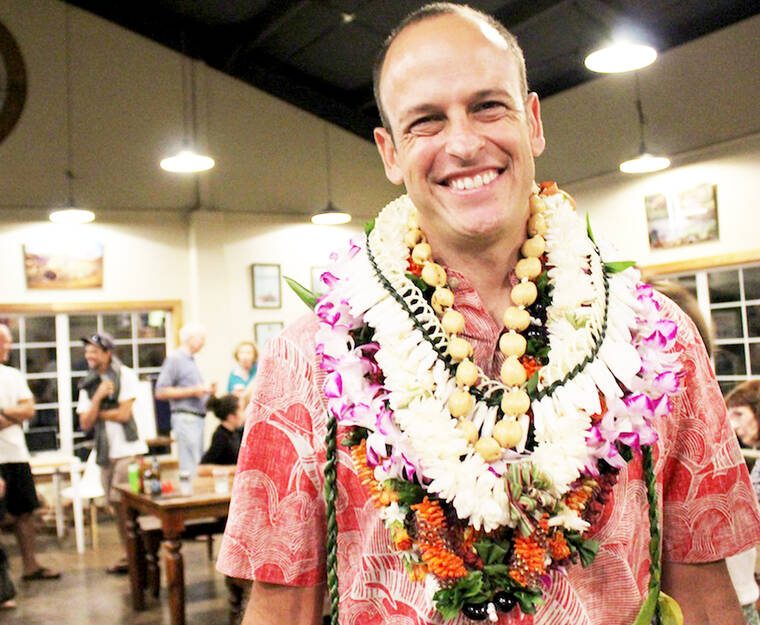LIHU‘E — A potential county ordinance to increase the island’s number of public charging stations is in its early stages.
Kaua‘i County Councilmember Luke Evslin previewed a draft electric vehicle (EV) bill that would increase charging outlets during the Kaua‘i Climate Action Forum’s online panel Wednesday.
The potential legislation, Evslin noted, is being crafted in collaboration with Councilmember KipuKai Kuali‘i.
“What I’m putting out here right now might not be the final form that this bill takes, and it might even be a little bit premature to be talking about this,” he said. “But I got excited about this forum.”
The draft, in its current form, would require new parking lots of over 50 stalls to include a dual level-two charging station. Existing lots would be given two years to come into compliance, and the number of required chargers in good working order would increase to four per affected lot by 2030. Failure to comply would be a zoning violation. The bill has not been introduced to the council.
The 50-stall minimum is half of current state requirements, which mandate chargers in lots of 100 stalls or more. It also presents a number of issues that need to be resolved, according to Evslin, who said the number-one problem is potentially burdening “cash-strapped” small businesses.
“This ends up bringing it down to not just the Hyatts and the Walmarts and the Targets, but a number of small businesses would certainly be lumped into having to provide charging infrastructure,” he explained.
County facilities — including every beach park and neighborhood center — would also be affected, calling for upgrades to install and maintain up to 50 new charging stations. Such an increase would eliminate the county’s ability to fully subsidize each unit, meaning drivers who now power up for free at public chargers would have to pay.
“The downside of having those charging stations is having to charge at relatively high rates, at least compared to what somebody could charge from home,” Evslin said.
“It’s going to be clear that even those high rates are still gonna be far, far, far less than the cost of filling up a car with gasoline. But I think it’s important, at least for me, to have a better understanding of whether people will still utilize the network if the price per kilowatt exceeds the price of electricity.”
Evslin said both he and Kuali‘i encourage members of the public to contact their offices to discuss the potential legislation as it’s crafted.
The councilmembers’ initiative comes in the wake of state legislation passed this summer that authorizes counties to adopt ordinances enforcing EV charger mandates and establishing penalties.
Noel Morin, president of the nonprofit advocacy group Hawai‘i EV, was Wednesday’s keynote speaker.
The state has 16,588 registered EVs in total, or 3.67% per capita. That small percentage actually reflects exponential growth, according to Morin.
Kaua‘i has more EV ownership per capita (0.68%) than Hawai‘i Island despite its far-smaller population, with 495 of Kaua‘i’s 73,298 residents driving electric vehicles. Honolulu County leads the state with 1.28% EVs per capita, or 13,061 vehicles registered among 1,020,000 people.
”We’re doing a lot here in Hawai‘i. When I first got my electric car — I think was August of 2011 — I think there were less than 500 or so EVs in the state,” he said. “It’s growing very, very well year over year.”
Both Evslin and Morin anticipate this upward trend to continue due to a host of factors, including the increasing affordability of EVs and major brands’ commitments to building fully electric fleets.
The online panel also featured Gordon Talbo, an automotive instructor at Kaua‘i Community College, who said his program has incorporated fully electric cars into its lesson plans.
•••
Scott Yunker, general assignment reporter, can be reached at 245-0437 or syunker@thegardenisland.com.








Does the county have plans for increasing electric energy production for all these charging stations and new electric vehicles?
There are a couple of questions that come to mind reading this article. Will these EV charging stations be hooked into the grid or solar powered? Hooking to the grid might be more costly and will create excess strain on the grid. How much do the current charging stations get used by the public? How much do they get used by the county? There is an asumption that all EV drivers will be at big box stores and need/want to charge. Courting independent owners of solar charging station placed around the island might prove more convient for drivers. On a small island the use may not justify the infrastructure. As a high mileage daily driver, often 50-80 miles per day. I would find no need to charge at any public station as EVs typicaly provide 100+ miles per charge . We will of course need more charging stations as we beging to switch to EV’s and consumer needs change to want more convenience. But, is passing mandates before studying the need for a specific local (Kauai) the best course or a power play?
This would be great! I hate going to Costco and seeing a gas vehicle parked in the only EV spot because they’re “just getting a pizza.” Walmart needs more, too. With car companies offering more EV choices we need more chargers! Especially when employees use charging stations all day while they’re working and there aren’t any left for those who are running errands around town.
Perhaps you should stop spending money on the electric vehicle rush until the electric vehicle stops using fossil fuels to generate the electricity it provides, is cheaper to run than gasoline engines, and you have a plan outlining what you’re going to do with the hundreds of millions (thousands on Kauai) of electric vehicle batteries in a few years when all of them need to be replaced in the same timeframe, and forever! Batteries are many times more polluting that fossil fuels.
looks good on paper, but not in real life….haha…we cannot even keep our cell phones charged at our house, much less 3-4 cars… and grandma’s on the weekends !!
Every electric car owner likely has the ability to charge at their own home and plan driving around their ability to charge at home. Is it really necessary to burden businesses and taxpayers with essentially unnecessary chargers? If outside charging stations are necessary let businesses fill the gap in a for-profit way.
Get real Luke. Nonsense fairy land idea. Btw where do all the batteries go Luke when pau?
How long do those batteries last? Probably longer than common car ownership. My 16 year old Prius batteries were still original (and just fine) when I gave the car to my niece after 300k miles.
So not sure which person is in fairyland here…
This idea is brilliant. The whole reason I have put off an electric vehicle for myself is not being able to do the Kilauea to Ala Moana shopping center round trip without recharging.
If the People want electric chargers in private parking lots businesses will accommodate on their own without the hand of big government. These law makers just have to make a name for themselves with force.